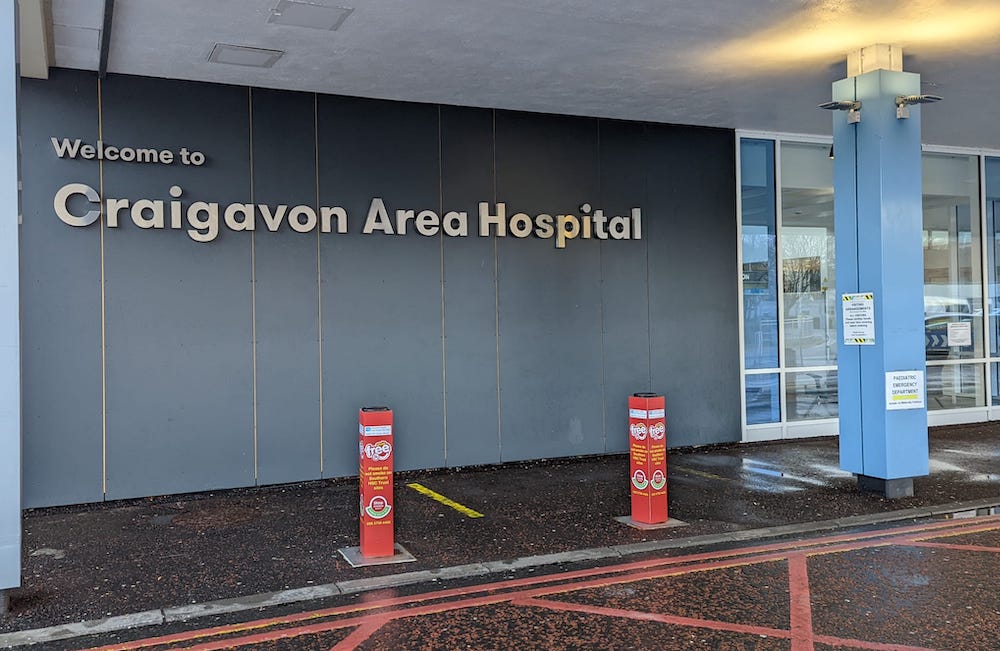
A major review into cervical smear tests in the Southern Trust area led to 11 women having to be referred for further treatment.
Meanwhile, concerns about the “accuracy” of original test results given to eight women – subsequently diagnosed with cervical cancer – were also identified.
In relation to those flagged as in need of follow-up as a result of the review, the 11 required treatment for pre-cancerous cervical cell changes or “another significant incidental finding”.
Confirmation comes as the results of two reports have been made public today (Wednesday), with the Southern Trust once again apologising for the “distress” caused.
It was in October last year that the Trust launched what it described as a “precautionary cervical screening review” for 17,425 women, something which led to the formation of the ‘Ladies with Letters’ group.
Carried out in partnership with the Public Health Agency, the purpose was to check that the original screening result provided for each woman was correct and offer follow-up care for any woman given an incorrect result.
The findings will now undergo independent expert review, with work to begin imminently.
Of those invited to take part in the review, 16,346 – or 94 per cent – did so. Of these, 96 per cent of women who had a slide reviewed had no change to their original result. Additionally, 96% of those who attended for a smear test had a “normal” result.
Overall, 64 women were invited for a gynaecology or colposcopy appointment for further assessment and 11 of these women required treatment – for pre-cancerous cervical cell changes or significant incidental findings.
As the main aim of the Cervical Cytology Review was to find women who may have been given an incorrect smear result so they could be offered follow-up to reduce their risk of developing cervical cancer, it did not include women who already had a confirmed diagnosis.
A separate companion report revealed “no significant difference” in the rate of cervical cancers diagnosed in the Southern Trust area compared with the Northern Ireland average, nor in the number of deaths recorded.
Between 2009 and 2023, there were 207 cases of cervical cancer diagnosed by the Southern Trust.
The screening history of all these cases was assessed to determine whether, had they not been diagnosed with cervical cancer, they would have been included in the review.
In all, 12 (5.8%) of the 207 women diagnosed with invasive cervical cancer during this time would have been included in the review because their last smear before they were diagnosed was read by one of the screeners. The first of these was diagnosed in 2011 and the most recent in 2021.
All 12 cases were subject to detailed assessment as part of the Audit of Invasive Cervical Cancer.
This has identified concerns about the accuracy of the original screening result in eight of the 12 cases. Five of these eight are subject to further investigation in line with the regional serious adverse incident process.
Dr Stephen Austin, Southern Trust Medical Director, said the Cervical Cytology Review Outcomes report showed that, for the vast majority of the women included in the review, their original result did not change.
He added: “The purpose of the review was to check that the original result provided was correct and to identify anyone who may have been given an incorrect result.
“While it is reassuring that the vast majority of previous smear results have been reconfirmed as normal, the review has identified 11 women who are now receiving follow-up care from our gynaecology services.
“We acknowledge that the failings in the cervical cytology laboratory extended beyond individual staff members and included system failings. The Southern Trust and PHA are committed to ensuring these failures never happen again.
“I wish to sincerely apologise again to women and their families for any distress caused by this review process and the publication of the outcomes report.
“I really hope that women will have been reassured that either their original result was accurate or that they are receiving appropriate care where that has been required.”
Dr Joanne McClean, Director of Public Health at the PHA, accepted that it “undoubtedly been a worrying time for many” of the almost 17,500 women affected by the review.
“This is one reason why it was so important to undertake such a comprehensive and detailed review,” she added.
“We also wanted to take extra care to ensure the result women received was correct so they got the follow-up care required. I am very sorry for any distress or worry caused by this review.
“I would like to thank colleagues in laboratories across Northern Ireland who worked so diligently to help us complete the review in as timely a manner as possible.
“In parallel with the review being undertaken there have been important improvements to the Northern Ireland Cervical Screening Programme.
“The primary HPV method of cervical screening is now in place in Northern Ireland, which has increased our ability to detect early cell changes that could lead to cancer.
“Cervical screening saves lives and it is essential that women continue to attend when they are invited.
“Our screening programme is very effective and the improvements put in place in the last year will make the programme better at finding women with abnormalities which put them at risk of going on to develop cervical cancer.
“But we will only find these abnormalities in women who attend for screening. I ask all women who are invited to attend for cervical screening to please attend. It could save your life.”
Cusher TUV Councillor has since called for a public enquiry.
He said: “TUV was the first party to call for a public inquiry into this scandal back in September after I had the privilege of being part of a delegation which met with the Health Minister.
“At that time, my colleague Timothy Gaston MLA gave a commitment that he would use his position to press the Minister on the need for a full public inquiry under the terms of the Inquires Act.
“I regret that three months later Minister Nesbitt has still failed to even answer a series of basic questions on the scandal – even though Assembly standing orders require that he respond to MLAs within 10 days.
“I am pleased to say that Timothy has promised to revisit the issue before the Assembly closes for the Christmas break and press the Minister to not just answer the questions put to him but to clarify just how long he has been sitting on draft answers provided by his officials.”






